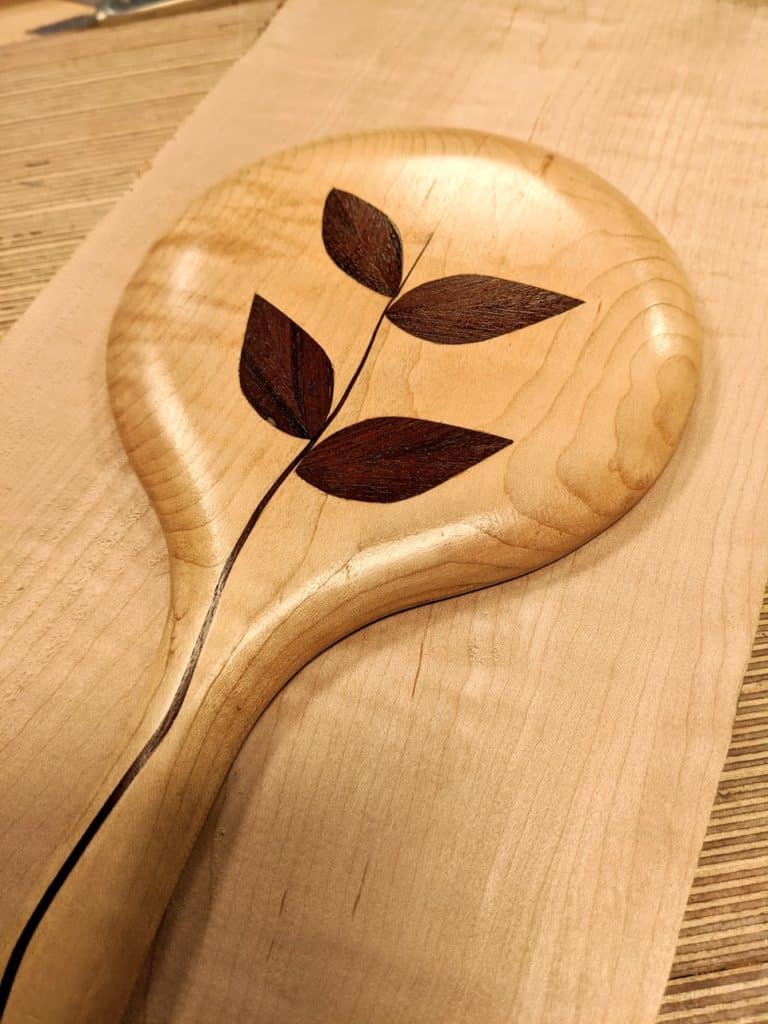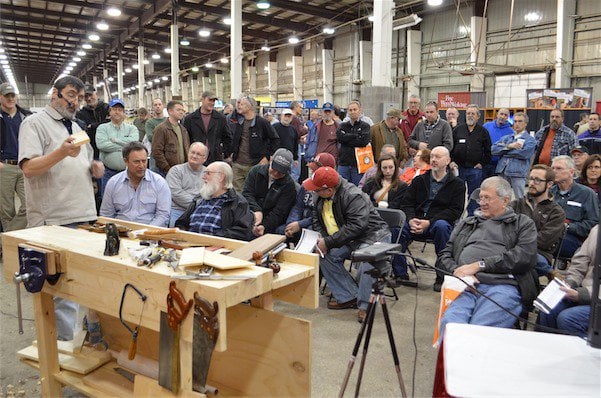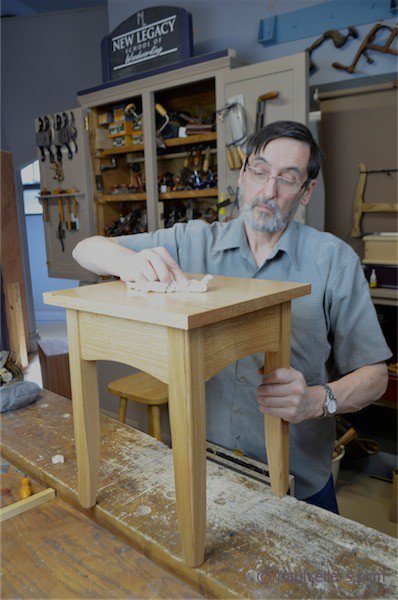The Future of Apprenticing
Well, is there a future for apprenticing? Not much of one. I lament the reality that many who would learn the craft and art of furniture-making must get the basics by spending £30,000 on a degree course often taught by people who never made a living from doing it themselves. Indeed, one college lecturer I know told his students that you cannot make a living from furniture making when I had just told them that they could and that I had done so throughout most of my career as a furniture maker. My designs now grace the Cabinet Room of the White House, the homes of President Bush, and then too the homes and offices of people like you and me. I have made for the very rich and then too the poor who might never own one of my pieces. There was nothing special about me. right place, right time. Something like that. I loved these opportune times in my life and I did indeed make a living from my work and raised a family of four on a single wage.

It has made more sense to many this last six months, perhaps even more I think than ever in recent history, for people to launch themselves off into trying for a new craft. But I love this though! There can be no doubt in my mind that most people can develop skills in their chosen sphere if the right instruction is available. The trick now is sifting through the straw for the needle in the ever-growing global haystack, which is indeed a major issue. Instruction search comes at a price — your time! Read but one online catalogue and you might well be forgiven for ending up confused. Look through three or four and you will realise the ‘copy-and-paste’ buttons are used extensively by the so-called ‘sales team‘ to flesh out the information put out. I can’t recommend a catalog anymore, and nor do I recommend a magazine either. I can’t.

I make a point not to copy anyone anywhere and when you write and ask me whether I watch this or that youtuber, blogger or vlogger I should tell you this and then ask you not to ask me: If I have watched 30 minutes of woodworking guru output since YT came into being 15 years ago I would likely be exaggerating 10 times. I now try to attend a craft show of some kind once a year or so, where I can see crafts like pottery, sewing, upholstery and glassworks, but by the time I have seen men hoisting themselves up poles with huge axes to chop them down a couple of times and chainsaw carvers with mini chainsaws and giant hoggers representing the woodworker’s section I am about done in. I don’t have ay desire to attend woodworking shows generally. Machines hog centre stage all the way. I find them just too sterile and dull. Mostly that’s because of the noise of machines etc. Spoon carving with knives and such take me along a journey in my mind asking when were spoons made with an ax and a knife and how long ago did itinerant farmers stop off at a farm for a week to make a dining set for a farmer’s family. I’m guessing that most chairs for the last 80 years came from Eastern Europe and at one time I saw only Romania branded on the undersides of chairs. The chief exporter of furniture today is of course China with an estimated 39% of the world’s furniture production coming from those shores.

It seems ever sad to me that we are indeed losing the system I grew up in as an apprentice, so my work has become all the more important in providing a egacy for the ensuing generations and those in this present age to pass on to their children and friends. It’s not a boast but I am pretty much the last of my generation who trained and apprenticed under half a dozen older men who kept me in check and showed me their ways. I recall one master telling me to climb on his bench and sit on the pad of a brace while he held it upright turned the handle beneath me. The added weight drove the bit ever deeper at an otherwise high and awkward spot and the result was a deep hole. It seemed a small thing but multiply this ten thousand fold and ypou will see things that might well be hidden forever.

So you see, I see that it is difficult to know exactly who to turn to for the right instruction. Is it possible that we might find all the instruction we really need online these days? Well, in my view at least, it is probably as good a way to learn as there is and especially if you have to find thousands of pounds, dollars, krona or francs or whatever other currency needed to pay for few weeks of instruction. In our endeavour we made it simple. Our foundational training, training about tool use, maintenance, projects that introduce you to woodworking principles and methods and techniques, is always free, be that in written form or video, on woodworkingmasterclasses.com or commonwoodworking.com. It is my belief that anyone new to woodworking that is willing to invest in a cluster of secondhand tools, some wood, and so on, can be a fairly competent woodworker within one year if they can give 4-6 hours a week to it through these channels.
Finding the Time
I know! Where do I find 4-6 hours a week? Well, for a man like me, at one time used to watching 6 hours of TV a day in my younger years, it was difficult. So in 1986, aged 36, I completely stopped watching TV and started writing, photographing, drawing, researching and studying attitudes developed towards work, the history and development of work, the Industrial Revolution, Consumerism and its bed partner Economics. It didn’t take me too long to realise every single thing people did had a price tag to it and that everything people did was to somehow make or save money. I also saw that most people lived very much in fear of losing what they actually didn’t have. COVID-19 has confirmed my point of view on this. If most people were buying furniture made no longer in Europe or the USA but Asia thern why was that and what could change it? For me it was different. I found tht there was and still is a clientele out there that is willing and able to either pay the double nd triple and more for handmade pieces or designs or that were willing to save the money because the wanted a one of a kind piece especially made for them. I also discovered very nice people who both wanted to support a local artisan and was prepared to save for the one special piece I speak of, that they could own for a lifetime, a rocking chair like this for instance.

Woodworkingmasterclasses.com has proven to be one of my great successes. Piggybacking my decades of experience in a background absorbed in full-time furniture-making, woodworking, and woodturning with my opening schools for woodworking led, Joseph and I to start to put together courses online. Remember I had been writing curriculum and how-tos for decades in my spare time in the evenings and such. My quest to train on an international level without geographical attachment became only possible through accepting and learning that technological changes need not be shunned but accepted as a viable apprenticing alternative to replace what was actually gone. I have students in colleges around the world write me and tell me how they learned more in a month of my online videos than they did in their three-year, tens-of-thousand dollar courses. I am not interested in padding out my income by teaching and training and seeing people struggle to find the cash and go into debt. My courses are different than most. Here I have an instance for you to consider. This cabinet that I just built might cost you about £12 a month to access 674 videos covering 88 projects from beginner to advanced levels and then all you ever need to know about buying, maintaining and using hand tools and such (the latter is always free as are many of the projects). Projects like this computer desk are tone skill level whereas the stool is at another. How about a beautiful keepsake box for Christmas and birthdays? So here it is. If you were to sign up as a paying member you would be able to access every single one of the 674 videos together with all the drawings and cut lists, diagrams, and much more. You have access to the forums and so on as well. And, importantly, not that we want you to, we make it so easy for you to cancel your subscription whenever you want to too. This means that you can cherry-pick what you want to watch or need.
So our success is your success. People around the world are finding my work as a master furniture maker an invaluable resource. We never copy the work of others because, well, my quest remains the same as it was from the beginning and that is to pass on all that I have been given and blessed with to the generations yet to come.



Thanks Paul. I stumbled into your videos after I had remodeled my garage and was trying to figure out what machine tools to buy. A few of your videos and it all clicked for hand tool woodworking. Normally, I don’t make such decisions quickly but it just made so much sense.
I started watch all the free videos. Decided I liked what I say and subscribed to your master class. Four or five years later, I have no regrets. Money well spend.
Oh, I think you are spot on about tv. It is a huge wasteful time sink.
I’ve been a WWMC member for a long time, and throughout I’ve found it an inspiration and a pleasure.
I have learned a lot, but equally importantly it has fed my passion and been a positive influence on my well-being.
I’m still taking the first steps to get into real woodworking, I mean, diving in to join the amateur with the professional. Since I’ve been learning from you, Mr. Sellers, you’ve taught me, corrected, or confirmed many things. That you must never do your work for the money is one of them. That you must hear and feel and ever be into learning as you make something is another. And that what you make must take into consideration the life of the wood that you are using. Well, those and many things more, much of wich we have lost with the usual way life has been promoted to us and will still be to the next generations. Unless we work in another direction. And it’s truly not to shun the true advances we conquered, like you said in your article, but to learn how to use these steps without losing the old steps that remain so valuable. One would not want that the previous part of the bridge he’s crossing to be cast aside only because there’s a beautiful, different painting on the section he’s now. But that’s the kind of nonsense we’re seeing. And that creates the reaction that’s equally bad, that is to cast aside the now. Well… I wandered very far from what I really wanted to say, and that couldn’t be more simple: thank you, Mr. Sellers. I have not the means to thank you enough, but I can continue the woodwork here where I am, and perhaps, within my path, even pass something for the woodworkers to come.
I’ve been paying my “dues” to WWMC for several years. I find it a club with virtual members.
I watch your instruction at times while at my bench and at other times, in my chair while I enjoy a bourbon.
Via your enterprise (and of your team’s) I need look no further to guide my pursuit of hand tool woodworking. Many thanks.
I’m on the east coast of the USA and would find it very interesting to see a geographic breakdown of other members worldwide.
Yes, WWMC increased my knowledge significantly. There is still plenty areas for learning (wood movements, joints to use in the own projects as some examples). It would be great to have old master behind my back watching my work sometimes. As per books on “achieving mastery” it is hard work, 10 000 hours etc. and then trainer/master doing little correction to your work (I noticed that I correct myself obviously but it takes much more time sometimes). I would leave my Corpo job if I had opportunity to apprentice with the master of woodworking (hand tools one I mean).
It might be the case that I want things to happen too fast and should take it only step by step…In any case I will continue my membership with WWMC as it is best I can have for now.
I agree, I don’t see any signs of apprenticeship programs outside of the large trade unions, at least here in the States. I’d be interested to know if it is different in other countries. I know European countries have much stronger guilds and unions.
What I would dearly love to see is more educational funding and focus on vocational training. Since the 1960’s, all educational funding has shifted towards the “College Prep” model in high schools, preparing students for 4 year bachelors degrees. And we all know the results of that; massive student debt and a dearth of entry level jobs that require bachelors degrees. Meanwhile, positions in the trades go begging due to a lack of candidates.
A large part of the problem is that a college degree was a such a cherished goal for our parents that it has been deeply engrained in us. I have 2 college age sons and discuss this topic with many other parents. Its interesting to hear that them all agree that the future is brighter in the trades, yet they all are sending or are planning to send their kids to expensive 4 year colleges.
“all agree that the future is brighter in the trades, yet they all are sending or are planning to send their kids to expensive 4 year colleges.[…]”
Much of it has to do with (perceived) status, I expect. There is no status attached to such jobs. Parents can’t boast about their son being a plumber or electrician, or furniture maker even. Neither can future wives.
Someone with a machine shop about 20 years ago told me a story of how his nephew was very interested in learning metalworking but was strictly forbidden by his parents as that was work below their standards. Once they found out he snuck out to his uncle occasionally to visit him working in his shop, helping out and learning, all hell broke loose. I find such an attitude amazing and incomprehensible, then again, to each his own. Personally I get satisfaction out of being able to fix the toilet or the electricity, and also being able to solve differential equations when needed. (though the former two tasks are much more prevalent for me than the last… and always more urgent!)
Quote: “Much of it has to do with (perceived) status, I expect. There is no status attached to such jobs. Parents can’t boast about their son being a plumber or electrician, or furniture maker even. ”
I agree with you 100%, as I myself am a product of such parents. Today I bitterly regret listening to my Mom instead of choosing my own path sooner in life. Too little, too late.
Nemo, I certainly agree with your status comment. A huge bias exists against working with ones hands for a living.
And while we all see the reality of college degrees declining in value while at the same time costs skyrocket, we all hope that our child will be the fortunate one that lands a decent job.
Yes, the irony is that many trades people will make just as much – if not more – than people with degrees. People are different; trades are for some, uni for others. As a grad engineer, I learnt a lot about repairs to big aircraft from the people who actually did the repair (or tried to) my colleagues had designed and approved. What I found most useful was to ask the questions “What did you do last time?” plus “What worked, and what didn’t?” Then I’d go away and try to produce a repair scheme which satisfied both of us.
I’ve said it more than once and it remains true to this day, your Master Class tuition is the best money I have ever spent in woodworking, bar none! Thanks for sharing. Btw, Texas misses you!
Paul the world is for ever changing, these days young people want hot shot clothes, hot shot Cars and the hot shot social life. They want money for nothing, who doesn’t tho, but the reality of it all is that you have to work and earn. it will sometimes seems like it’s pointless, some people just can afford just to put the roof over the head and just Exist and breathing some are contempt some are not.
I missed out on an apprenticeship when I was younger, got pissed off seeing people given the opportunity to learn a craft and skill that will earn them a living, just to see them toss it down the drain.
But really if you look back at the times it the influences of celebrities and cooperations, that build up a false sense of what life’s about. Relying on bank mum and dad. Back when you was a whipper snapper your mum
N dad had to work just to put food on the table there were no such thing as job seeker allowance or what not it was simply you work you eat you don’t work you don’t eat. Plus the masses of people that is living longer and being born. Plus there’s not enough work to go around.
I do understand why you say what young people are like but I don’t t all think a blanket statement as in your first paragraph really is true at all. I find young people truly amazing 90% of the time and that a few have been duped into believing that sports fame or business success will move them into the lifestyle you speak of. Go back fifty and more years ago and the image of the soccer player of a famous team didn’t scream after his great goal or brace himself with his body locked and his jaw wide open roaring at what he did. Fashion too was down-played and people did not drive ordinary cars in adverts like tomorrow didn’t exist. These things have their impact and teenagers and little ones emulate their sports heroes as if they too were in the field earning half a million for a big game.
This is the first time that i think that I’ve seen you sell yourself so to speak, or rather to advertise your wwmc in this way. I watched loads of your videos on youtube before i realised that it existed as you’re not pushy about it. Likewise your books.
I really like that approach actually as it comes accross that your motivations are genuinely helpful towards would be woodworkers who have the desire to learn and that you’re passionate about this in a not in it for the money kind of way.
I found out about your books, dvds and wwmc’s off my own back and have invested in all, as I wanted to support your endeavours in some small way even though there’s enough free content on you tube to have kept me going for years i think, and I will continue to do so, and it is the best money I’ve ever spent.
I still feel like i’m in your debt!
Thank you!
The videos are fantastic. You have the ability to teach and craft at the same moment in a way that makes it easy for an average joe (like me) to comprehend. I, like many others, are extremely grateful to you for this gift you share.
Today’s article really hit home. Think I actually cried while reading it. The world we live in has changed and unfortunately most of it, not in good ways. Is the goal in life to lose the past and any ability to do things ourself? It used to annoy me when the new young guys came in to work and didn’t know which wrench to grab when told, or you have to read a bit of this manual before working on that, or you have to measure the amount of fluid!!! Then it scared me. How could someone not know these types of things? What the heck did their fathers teach them? I honestly believe that my generation (I’m 60) failed. When I look at the world around me-the way we act, how we treat others, it’s very sad. And that’s why your article hit home. We have a job to do. I need to learn so that I can teach in a kind and considerate manner. Damn, this has gone over the mark a bit. Not fit for publication either. Guess I just really wanted to say thank you.
Oh and for the one guy who asked, I live just outside of Chicago.
I am 71 and sometimes look back on my life with regret. Neither my father, an engineer who emigrated to New Zealand and built his own house, nor my step-father, a carpenter and joiner who built wooden castles and ranch-houses for us kids while he was working away from home, encouraged me to do things with my hands. I was seen as the “brainy” one of the family. Don’t get me wrong, I could always assemble flat-pack furniture, none of my shelves ever fell down and I did almost all my own car maintenance but I never actually made anything.
Then I discovered Ben Crowe of Crimson Guitars on YouTube and fell in love with woodwork using hand tools. I enrolled in a repair and maintenance course and almost needed clean underwear when Christopher, the instructor, casually told me to remove the neck from my 53 year old guitar! He was so calm and patient that it seemed rude not to comply. After that, I replaced the frets, stripped the old lacquer, refinished the guitar and reassembled it. I’ve never been afraid of doing a job since.
Having got the bug, I started trawling the internet for more instruction in woodwork, especially using hand tools and came upon this old guy with the calm, relaxed manner that appealed to me. I admit that dovetails still seem like a dark art to me, which I have yet to master, but I have made some of the smaller projects including the butter/pate spreaders which went down very well with relatives and friends.
About 18 months ago I came to an arrangement with theatre friend that I would make and repair stage sets and props for him in return for space in his warehouse. I still have a small workbench and my favourite hand tools at home but the warehouse space let me build about 80 display frames for a festival at Goodwood last year and most of the set for CATS, among other things.
I don’t know how much longer I have left but I do know that as long as I’m playing bass for shows and making things with my hands, I’ll have no more regrets.
“It’s not a boast but I am pretty much the last of my generation who trained and apprenticed under half a dozen older men who kept me in check and showed me their ways.” I spent most of my life working as a sand foundry pattern-maker, marine and aircraft, mostly. My teachers were WW2 and Korean era veterans that bridged the time between the 1920’s and the computer age. I agree with your view of the last fifty years. It takes a real survivor to work in the trades, now and then, Cheers
In 1980 I began a search for a teacher of Blacksmithing. Time after time I got a farrier who said ‘Yes I can teach you how to show a horse’ which is a worthwhile thing in itself, but not what I wanted. I wanted to make tools. Finally I contacted a man who said ‘Yes I teach Blacksmithing, but don’t ask me to show you Farriering, I only teach how to make tools!’. At last! So I began as a student of Mr Gordon Blackwell, at the time the last Master Blacksmith in New South Wales, Australia. He started at age 15 in the coal mines at the beginning of WWII. He had a regular shop and an Apprentice. But, the Government would not subsidize the Apprentice so the lads own father did!. Now of course, their are Blacksmiths everywhere! Interestingly, we took our young family to an old lumber camp that had been revitalized as a tourist spot. There was a Blacksmith. I saw him pounding away on a piece when he suddenly threw his hammer up over his back and without looking around, catch it above his head!
‘A Student of Mr Blackwell I presume?’ ‘Oh yes’ he said ‘did you learn from him as well?’ ‘you bet’ I said! It was Gordon’s great trick he showed his students. Now this place was about 300 kilometres from where we had both learned our craft and I lived another 300 kilometres further north by then. Of course you can learn Blacksmithing in Sydney now, tool making etc, by, as you say, book learnt and certificated experts. But Gordon Blackwell taught us things that aren’t in books. Only gathered by experience and hard yakka! Cheers. I am nearly 70 and starting up my woodwork shop. I probably wont be able to work it for that long, but I have definite plans to work it. Thank you for your teaching. Jim Donald.
Great story, Jim Donald. Thank you for sharing.
Regards
Adam
Thanks Paul both of your recent blogs are very inspiring for me. Looking forward to more videos and the house full of furniture project over next few years. Keep enjoying your breakfast.
I started a project of making six of the desktop organizer that you posted plans for. I cut all of the parts first, and the began cutting the dovetails. By the time I got to the fifth organizer I was cutting nearly “perfect” dovetails using the technique I learned from one or two of your YouTube videos. Thank you.
I found your comments on apprenticing interesting. You have been very successful in your woodworking career. I was very successful in my career as an actuary. I found it easy as I suspect you found woodworking. I think our personal experiences give each of us a bias. Making a living was “easy” for us, but that does not mean that everyone will find our respective professions easy or possible.
You have real creative talent. I suspect that your talent was not “learned” but was “natural”. You are an exception. While there are a few who are equally exceptional, not many who begin any career will be exceptional.
I enjoy woodworking as a hobby and an activity that fills my time in retirement, but l will never have your creative talent in woodworking.
I see now at 70 that what makes life easy for me is that I don’t see words but pictures in my mind. I work out maths problems by seeing a whiteboard and moving numbers from place to place, crossing out and jotting down on the whiteboard the result as I go. mention dovetails or mortise and tenons with haunches and grooves and the image appears clearly in my mind. When computerists dhow a three-dimensional image on a cad program and turn it to get a different perspective point of view and expect me to be amazed I am usually not because I have done that since I was fifteen years old.
If only I could have the years back, I would somehow find an apprenticeship position, and do what I have always wanted to do.
Anyone out there that is young enough to do so: if you love woodworking, it would be a shame to get caught up in some 9-5 rat race job, when there is the possibility that you could instead spend time doing the things that you like to do. Find a way to make it work.
In the UK the government mire and more ties the hands of would-be employers by legislating the working conditions and insisting on a contractual basis of employment. Therefore, I would never employ an apprentice here in the UK anymore. The insistence on college training is generally a way of job security and making sure students go through safety courses that make them employable. Any artisan like myself can do what they do in a year in a couple of days of onsite shop working. What is called apprenticeship today bears no resemblance to what once was. It’s not the employer who is apprenticing anymore but the government controlling how best to keep control of what they really know nothing about.
…and yours is about the only YouTube channel I can stomach.
There’s one Aussie bloke I can watch on occasion, he’s got a few gems.
Thank you in your endeavor to record some of what you know that it might be preserved.
Paul I wish I could be your apprentice. UK or US both are thousands of miles away for me, but your YT has thought me so much more than I can learn from any local apprenticeship.
Hi Paul,
I’ve been watching your videos on YT for a while now, having stumbled across them by chance, and I have to say that I do enjoy them, and find them very informative.
In your blog, although you are talking about apprenticeships, you mention a £30000 degree course. I have to make you aware that I was able to spend 2 years at Newark College studying cabinetmaking, and it didn’t cost me any where near that. the first year was around £1300, and the second was just over £4000. There were some additional costs in the second yea (mainly timber and upholstery supplies), but it goes to show that it can be done for less than £30k.
Just thought I’d let you know that there are alternative, cheaper, ways of learning the craft.
Cheers,
I apprenticed as a carpenter in the 1960s. I greatly enjoyed my time training. Work was never a chore and no two days the same. I left my trade to work in the health service,better prospects or so I believed.
In the late 80s Ireturned to carpentry, teaching in a local technical college. What a change.,on my first day we were to cover trimming out the floor joists around a fire opening. Gone were the ideas of using joints and in came the idea of nailing an iron plate in place to hold the joists. The whole course was now designed to enable work to be completed in the fastest cheapest way possible. In the maths class the lads didn’t even understand that things like the area of a circle could be calculated without a calculator I managed to stick with this until half term then looked for pastures new. Love to watch Paul in action and hear the sound of sharp tools used with skill.
I, too, am one of a dying breed, having apprenticed at shoemaking over 40 years ago. I have watched as those serious about the art and trade dwindled to a small handful across the US. I have amassed a wealth of knowledge about feet and gait and materials and technique, but have found no one to pass it on to, and now my hands have arthritis (and yet I am now doing woodworking? Old fool, I guess). I find this a sad and profound loss, yet there’s no redress to be seen in the coming years.
I am currently trying to learn turning, all through YT videos. And learning general woodworking skills through channels like yours and a few others, as I cannot see wasting my few remaining years by falling into ignorance and complacency as one is expected to do in America when one “retires”. Which is strange since “retire” means to repair an old tire so that it can continue to be of use, right?
Ah, well, at least I have a fine Master like you, Paul, and for that I am grateful. I can’t wait to see what you do on your new house project. Stay healthy, stay vital, and keep creating.
College degrees and apprenticeships –
I do have a Bachelor’s Degree from a respected university. I paid for that the old-fashioned way: by serving six years in the US Marine Corps (trained as a heavy equipment mechanic) and then having the government pay for the tuition and books. (I thank the WW-II generation for creating the original GI Bill!) After a few years of doing work unrelated to my degree I came to a crisis point and realized it didn’t like what I was doing and wanted to work in electronics, a long-time interest. To accomplish that I joined the US Air Force Reserve band was trained in all aspects of communications systems. (The main technology used in cell phones was still classified when I was in the Air Force.)
(BTW, my grandfather was in the RAF from its formation in 1918 until he retired in 1947. Before the RAF he served in the RNAS, which
was one of the services that became the RAF. He started as an airplane mechanic and retired as a Wing Commander.)
After the initial active duty part of my Air Force service, I heard of an opportunity to get into an apprenticeship in electronics at a US Naval Shipyard – I jumped on it. Over the four years of the apprenticeship I learned much more about electronics – and electronic test and measurement equipment, and measurement science (Metrology) in general – than I previously imagined existed. Since then I have often counseled young people to seek out apprenticeships (if any exist in the field they want to pursue at that time.)
How is this relating to woodworking? After entering into the joy of marriage in 1971, I did as much of our auto maintenance as I could. (I never was able to get permission to install a hoist or lift in the apartment parking lot. 😀 )
When we bought our first house I purchased a radial arm saw and a few hand tools, informed by the memory of wood shop classes back in high school. I still have and use that my saw, and have added a lot of hand tools, so I am what some would call a “hybrid” Woodworker. (Not like our pair of hybrid vehicles, though.) Over the decades I have acquired a few more power tools, some as gifts (I have a generous wife), and others purchased new or used. (I have an old breast drill awaiting cleanup and some restoration.) I have also greatly reduced the number of my auto mechanic tools, usually by lending them to friends an neighbors. The only new purchase of that class of tools in recent years has been a couple of torque wrenches, because I need measurements in Newton-meters instead of foot-pounds)
I enjoy woodworking and it is my main retirement occupation. I make what I feel like making, mostly as gifts or to improve the workshop.
Probably my earliest woodworking memory is “helping” my grandfather in his workshed, an he asked me to pass him the “Yankee screwdriver” while pointing at a hammer. That must have been 1955 or early ’56, because we emigrated to Canada in mid-1956.By all accounts he was quite good as a woodworker. I remember being told that he made some carved door panels to be installed in the school at Chipping Campden – which he and my father both attended.
Graeme Payne
Maryland, USA
Truer words are seldom spoken.
As a [semi-retired] carpenter apprentice trades instructor, I have noted the demise of skills and quality expectation has been falling for decades. “pretty” is more important than quality. Training is rushed and tends to be poor quality turning out “journeymen” with only a glimmer of the trade.
Our trades training “system” puts more value in turning out apprentices as quickly as possible with little mind to actual trade knowledge and applicable skills.
The days when tradesmen were respected and valued has gone. Replaced by technicians that can exchange but not build.
Witness then how the “caste” system has invaded our society.
Paul, you have more apprentices than any craftsman in history!
Although, many times I wish I could feel things, like what sharpening is. I know what a sharp tool feels like to me, but how should it feel sharpening small things like plough plane irons for a expert? I don’t know if this makes sense, but I wish I could just spend an hour learning from you in person!
Your comment about spending $30,000 for a degree in woodworking reminded me about something Sam Maloof said at his workshop to about 10 of us. Our small group spent half a day listening to his ideas about design nearly 15 years ago.
One of the men had a son that wanted to be a woodworker. He asked Sam what he thought about spending $30,000 for a degree in woodworking.
Sam’s reply was, “$30,000 would provide all the tools his son would need, rather than spend it on a degree.”
My ambitions are and have always been different than most teaching woodworkers. My goal has been the preservation and conservation of my craft, craft practices, and then too the whole culture of handwork surrounding woodworking but certainly not through the artificiality of museums, reenactments and so on which were developed primarily for people to, well, muse over interesting things. In the beginning, I arrived in the USA and saw just how far down the machining route they had gone. I knew of and met no one who ever used hand tools. I began my long journey to reconcile opinions and now enjoy the fruits of my labours. I moved with the times because my attendees were so limited in that only those with the income and time could attend; many if not most could never afford the time or the money to come to long courses. I also saw that most if not almost all those professing to have a background in making actually rarely made it making. Our online courses have replaced the need to attend in person and the results have been astonishing. Most people can afford a few hours a week to actually make. We have resolved the issues of exclusivity
Paul, I know you no longer do woodworking shows, but I am eternally grateful for the demo you gave at the Woodworking Show in New Jersey many years ago. It triggered my move away from power to more hand work. Your guidance and confidence remain inspiring.
Those of us who longed for decades to learn the hand tool aspects of woodworking are grateful to you. That being said, I will never use those skills to make a living but truly lament the loss of the apprecticeship system we lost so long ago. We honestly need those back, as we have lost so much in our day to day. Speaking with plumbers, electricians and mechanics they all lament the fact they are a dying breed, with nobody to teach their skills or to replace them. That is a shame to my way of looking at life – we will always need the skills and or skilled trades to keep our world functioning.
I agree that the apprenticeship programs such as you learned in, Paul, are a thing of the past. But we all know that they were always a method of the shop owners to acquire more skilled workers, cheaply, so maybe its not such a bad thing. I’m sure we’ve all heard the horror stories of apprentice abuse from unprincipled masters, and I certainly (as much as I grieve not learning from the “old heads”) don’t miss that abuse. But maybe your way, the ‘lifestyle woodworker’ way, is a wave of the future; simply learning, and practicing, the trade you love simply for its own merit. We’ll all still have to face the thorny problem of eating, i.e. how to make a living, but perhaps this whole trend; shared in the US by the already ensconced and quickly expanding maker space movement, is at least part of the answer. A movement which you, Mr. Sellers, are a huge part of, at least as an inspiration, whether you realize it or not. As many have already said, thank you and your team so very much. You all do an invaluable service to the global community.